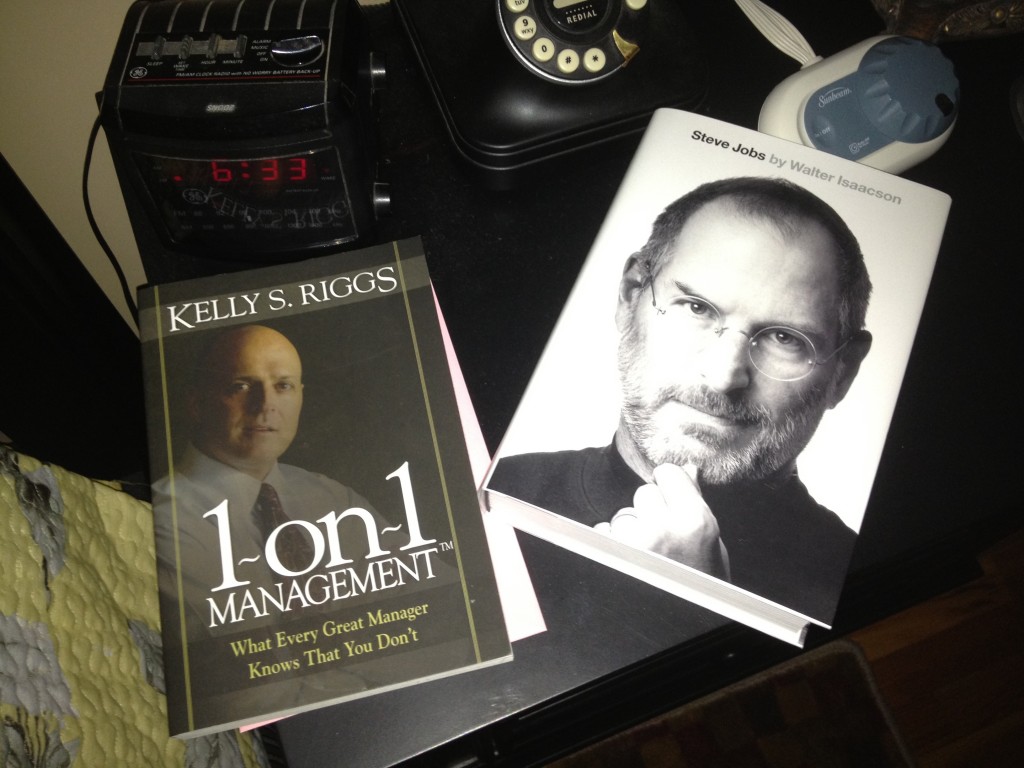Avid readers tell me time is their biggest issue when it comes to reading.
Author John Maxwell has what I see as the healthiest view of time management. Time, according to Maxwell, cannot be managed. Everyone gets the same 24 hours in every day. But some people obviously are able to do much more with that time. This is the result of how they choose to spend their time, Maxwell said.
 You cannot manage time, but you can control how you choose to spend your time.
You cannot manage time, but you can control how you choose to spend your time.
Making more time to read is about deciding to spend more time reading. This sounds simple, but it’s a bit (not much) more complex than just deciding to read more. I’ll bet you already feel your days are as full as they can get. That’s why you’re not already taking the time to read. You don’t feel you have time to read because your day already is crammed with activities. This is where the negotiation begins.
When you decide to spend time doing something, you also must choose what you will no longer do.
Making more time to read means determining what you will forfeit to have time to do so.
11 ways to make more time to read:
1. Read only books you enjoy
I sort of cheated here because I already addressed this in a former post, but it belongs here as well. Reading books you don’t enjoy takes the pleasure out of the activity, resulting in it taking you longer to force yourself through the text. You will find more time to read if you’re reading something you enjoy. This also may mean reading primarily from a genre you enjoy. I love true crime-type mysteries. I can’t put down a good “whodunnit,” which means I automatically eliminate other tasks to allow for reading
2. Power skim when warranted
It’s acceptable to power skim things you have to read for work or school or parts of books that you don’t really enjoy. You don’t have to take in every detail of every chapter to get what you need from a book.
For example, I recently read Stephen King’s memoir, On Writing. It was the smartest book I’ve read on writing in a long time, and I got a great deal of confirmation and inspiration from reading it. But several chapters at the end of King’s book were for those interested in writing fiction. They dealt specifically with plot and character development. While these concepts are important to the type of journalistic writing I do and teach (for example, when teaching feature writing), they aren’t a large part of what I do. Therefore, I powered skimmed them. I still got great information from the chapters, but I didn’t let them bog me down with details or examples I don’t need or won’t use.
Every word in every book isn’t written for everyone.
3. Read several books simultaneously
Do you remember that old Almond Joy commercial with the jingle “Sometimes you feel like a nut, sometimes you don’t.”? I’m sorry for getting it stuck in your head, but it’s an excellent analogy for why you should read more than one thing at a time.
I just finished reading The Immortal Life of Henrietta Lacks by Rebecca Skloot. The book was fabulous, but the content was clinical and sometimes heavy. I also am reading Blacklisted from the PTA by Lela Davidson. It’s content is light and fun. The books’ content was opposite.
I almost always read in this manner. I read one book for learning and one I call “summer trash.” I read “that which expands my knowledge and that which does not” simultaneously.
4. Always have something to read
An extra long wait at the doctor’s office creates a wonderful opportunity for reading. So does yet another two hour basketball practice for my daughter. There really is no reason with current technology that you should ever be without something to read. I do a lot of reading on my iPhone. This boggles peoples’ minds because they can’t imagine reading on that tiny screen, but it really works for me. I have my Kindle and iBook apps everywhere I go, which means I’m never without a book because I’m never without my phone. It’s much more practical than carrying around a physical book all the time.
5. Read to relax
There are three times I read most—right before I go to sleep, right when I wake up and when I’m relaxing in the bathtub.
I usually read for about 30 minutes before I go to sleep at night. That’s about all I can handle before my eyelids begin to droop, but it’s enough to get through a chapter or two. I also typically do this on my iPhone because the small back light doesn’t bother my husband as much as the light of my iPad screen or my lamp.
Like many people, my iPhone is my alarm clock and, therefore, checking it is one of the first things I do in the morning. I used to spend my “wake up” time (I’ve always been difficult to get out of bed. It’s a slow process for me.) checking social media. Now I spend it reading. In the 45 minutes I laid in bed this morning (a bit longer than usual, but I’m still on winter break), I read a short eBook, What the Most Successful People Do Before Breakfast by Laura Vanderkam. You might be interested to note that successful people don’t lay in bed for 45 minutes after they wake up, but they may spend time reading in the morning.
The mothers out there will understand the concept of my bathtub being my sanctuary. It’s the one place in the house where I can actually be alone (but, honestly, only if I lock the door), plus it’s the best place to warm up when it’s cold outside. I love to run a hot bubble bath, grab a book and relax for about an hour. It’s my favorite place in the house and a major indulgence.
6. Read during fitness
My brother is a fitness buff. Every now and then he will text me while I’m at the gym. When he gets my response to “what’s up” he usually tells me that I’m “not working hard enough” if I can text him during exercise. Brothers! You can’t read a book while you’re lifting weights (at least I haven’t figured out how), but you can read on the bike, treadmill or elliptical. Again, I usually read on my phone in these locations because it’s just easier to control than a book. You can easily sneak in a chapter while you’re doing a cardio warm up or cool down.
7. Embrace non-reading
I’m going to let you in on one of the great secrets of reading. You don’t have to physically read everything you “read.” Audiobooks are an excellent alternative to reading that still allow you to consume information. Audiobooks work well during exercise and while commuting. I average an audiobook every other week during my regular commute to and from work.
I have found that certain types of content work best for me this way. I have to be careful about the type of book I listen to because I don’t like wanting to highlight or remember something when I’m listening to an audiobook. For example, I listened to The Last Lecture by Randy Pausch and felt like I missed out on so many wonderful little morsels. I plan to buy the physical book and reread it.
When listening to an audiobook, I like to reflect on what I’m hearing. This works well, since my commute is one of my prime creative thinking times. Right now I’m listening to the parenting book, Get Out of My Life, But First Could You Drive Me and Cheryl to the Mall by Anthony E. Wolf.
8. Turn off the TV
My husband is a TV watcher. He loves relaxing in front of the television. When he is home, the TV is on. I am not a big TV viewer. I’d rather it be off. We spend a lot of time in the evenings doing a little dance that goes something like this. My husband comes home, turns on the TV and then goes outside to gather the mail or admire the growth of one of his many plants. I walk in, turn off the TV, then go on to another task. He comes back inside and turns the TV on again. Rinse. Repeat.
I understand that TV is what my husband enjoys in his downtime, but that doesn’t mean it has to be how I spend my evenings. If I’m reading a book that needs real concentration, I sneak away to my home office, bedroom or bath to read. If I’m reading a book just for pleasure, I sit with my husband and read while he watches TV. We both enjoy this time together much more when we’re each doing something relaxing.
9. Encourage your family to read too
My husband and 9-year-old son also love to read. My son always has something he wants to read. Unfortunately, this doesn’t really give me time to read since he still wants to read aloud to me. But I enjoy the bonding time and watching his love for reading develop.
My husband approaches reading much the way he approaches puzzles. I grew up in a family that pretty much always had a puzzle laid out on the formal dining room table during the winter. We would walk by, put in a few pieces and move on with whatever we were doing previously. Some nights we would sit for an hour or so together and work on the puzzle, but it was meant to be a casual and relaxing activity. I tried this a couple of times during my decade-plus marriage. Casual puzzle working is not possible for my husband. A puzzle on the table means he’s on a mission. He cannot stop working it until it’s complete. I’ve learned to only start a puzzle if he has some time off, otherwise he’ll be super tired from staying up late working on it.
Fortunately, my husband approaches book reading the same way. Once he starts reading a book, he usually cannot put it down. All I have to do is make books available. I try to make sure he always has something I know he’ll enjoy reading. This means less television time and more reading together.
My 11-year-old daughter does not share the family’s love for reading, which is heartbreaking for me, as you can imagine. It’s negative for me to have to force her to read for school, but we both know she must complete her reading goals. Working toward her goal means reading at least 30 minutes a day. Despite her feelings about reading, the 30-minute rule has created a lot of bonding time for us. We cuddle together and read nearly every night. Even though she doesn’t like the activity, she loves cuddling with me, which is a win-win for us both.
10. Read more books than blogs
I love reading blogs. My RSS Feed is one of my favorite addictions, and I learn a lot from the bloggers I read. I also have noticed the echo chamber. A lot of bloggers write about the same things or repeat each other’s points. The blogs I really enjoy reading are the ones that provide original content, which is what I aspired to do here. The best way to do that, in my opinion, is to continue learning. Reading books in various content areas helps me build this blog and strengthens my teaching. It may be controversial for me to say, but I get more out of reading books than I do out of reading blogs. It’s important for me to remember that because it’s much easier to read blogs and, therefore, it can become a default behavior. Making time to read a blog (or 40) is much easier than committing to reading a book. It’s also, at least for me, much less fulfilling.
11. Keep a running book list
There is never a time when I don’t have something to read. I have stacks of books in my home and work offices that I want to read. I have an Amazon wishlist consisting of 670 books. Finding something to read is not a problem for me, and I find value in most things I read.
I’m not sure this is the case for everyone. Students and professionals frequently ask me what they should read. That’s the primary reason I started reviewing various types of books on this site.
When deciding what to read, consider books that solve a problem you’re facing, help educate you for your future or challenge your thinking. Keep a running list of things you want to read and things you’ve already read. The GoodReads app is a nice way to organize your lists. Honestly, it’s fun to watch both lists grow.
I hope this post has given you some good ideas for making more time to read. Remember, it’s not about creating hours in the day, it’s about determining how you’re going to use the time you have. There is time in your day to read, you just have to determine what you’re willing to give up to do so. My guess is that it probably will be easier to find those sacrifices than you might imagine.
Let’s Talk Nerdy!
How do you make time to read? If you aren’t now, how do you plan to do so?



